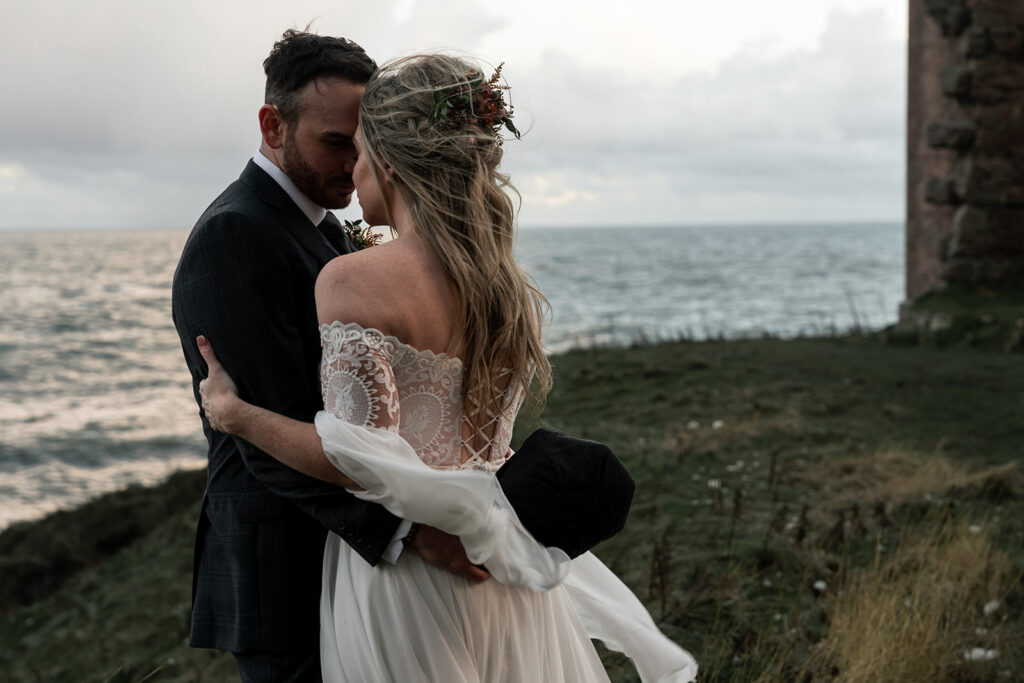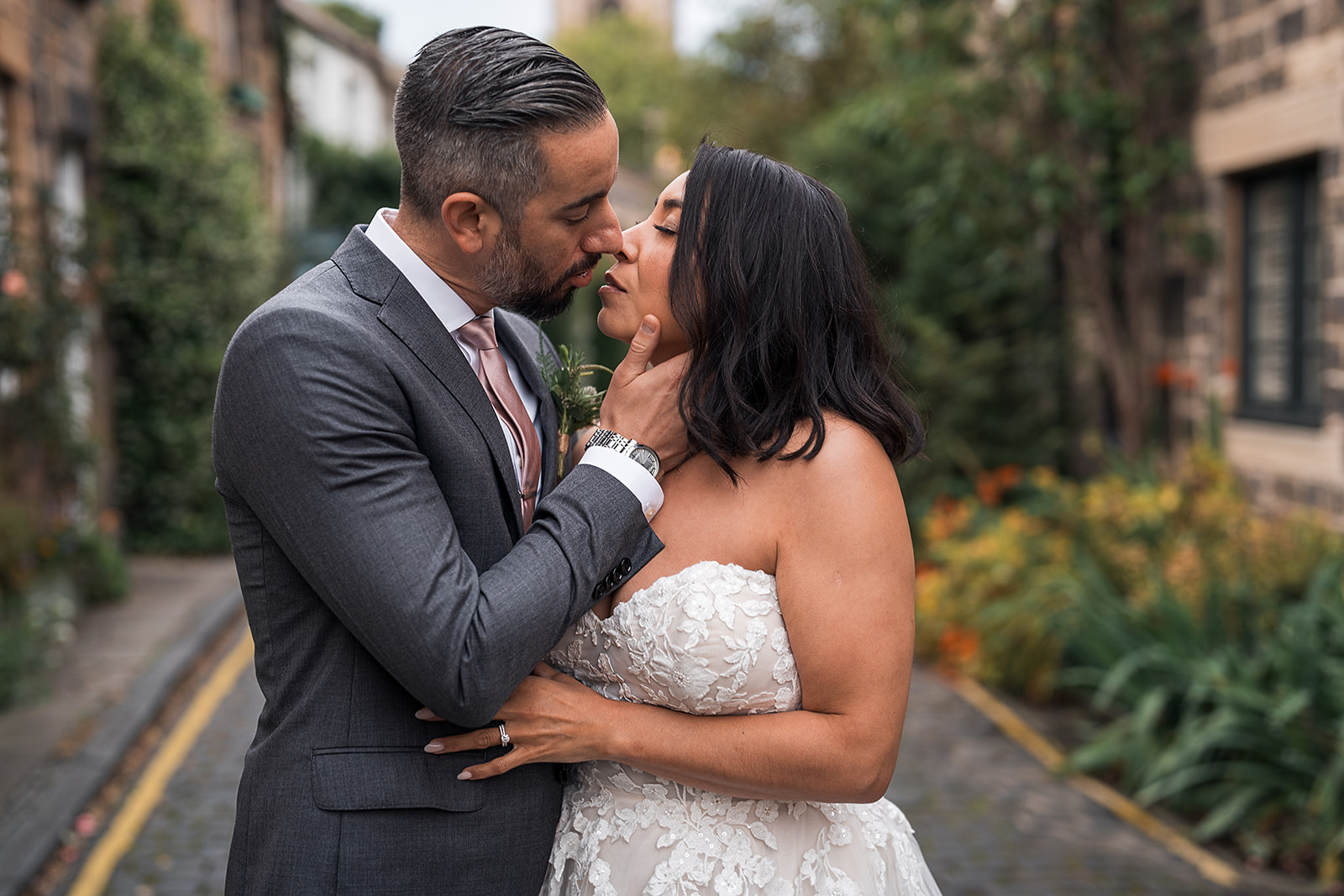When planning your Scottish elopement, one of the first decisions you’ll need to make is whether you want a legal or symbolic ceremony. Each option offers unique benefits and considerations, and understanding these can help you choose the best path for your special day. Here, we’ll explore the differences between legal and symbolic ceremonies, and discuss the pros and cons of each to help you make an informed decision. For either symbolic or legal ceremonies, we do recommend a humanist. You can find out more at the Humanist Society Website.
Legal Ceremonies
A legal ceremony in Scotland means that your marriage will be legally recognised by the state. This involves a few more steps and paperwork but ensures that your marriage is official once the ceremony is complete.

The Process
- Notice of Marriage: Both partners must submit a Notice of Marriage to the local registrar at least 29 days before the ceremony. This notice includes personal details and information about the ceremony.
- Documentation: You’ll need to provide certain documents, including birth certificates, passports, and any previous marriage or civil partnership documents if applicable. If coming from abroad, you may need a marriage visitor visa which can be obtained three months before travel.
- Registrar Approval: The registrar will review your documents and, once approved, issue a Marriage Schedule, which is required for the ceremony. The schedule must be picked up by at least one of the couple who are to be married.
- The Ceremony: The ceremony must be conducted by an authorised celebrant, which can be a religious or non-religious officiant. The location must be agreed upon with the registrar.
- Signing the Schedule: After the ceremony, the Marriage Schedule must be signed by the couple, the celebrant, and two witnesses. This document is then returned to the registrar to register the marriage officially.

Pros of Legal Ceremonies
- Official Recognition: Your marriage is legally recognised in Scotland and internationally.
- One Event: Your wedding day is both your ceremony and the legalisation of your marriage, simplifying the process.
- Traditional Feel: Some couples prefer the traditional structure and formality of a legal ceremony.
Cons of Legal Ceremonies
- Paperwork and Planning: There is more paperwork and planning involved, including submitting notices and organising official documents.
- Fixed Location and Time: The ceremony must occur at a specific location and time, agreed upon with the registrar, which can limit flexibility.
- Cost: Legal ceremonies may incur additional costs, including fees for the registrar and paperwork.

Symbolic Ceremonies
A symbolic ceremony, on the other hand, is not legally binding but allows couples to celebrate their union in a more personal and flexible way. This option is ideal for couples who want to separate the legal and ceremonial aspects of their marriage or who are already legally married.
The Process
- Planning: Without legal constraints, you can plan your symbolic ceremony anywhere and anytime. There is no need to coordinate with a registrar. Most couples still opt for a celebrant but some do choose to not have one at all.
- Personalisation: The ceremony can be entirely personalised. You can write your own vows, choose unique locations, and incorporate any rituals or traditions that are meaningful to you.
- Celebrant: You can choose any celebrant, including friends or family members, to conduct the ceremony. There are no legal requirements regarding who can officiate.
Pros of Symbolic Ceremonies
- Flexibility: You have complete freedom to choose your location, time, and style of ceremony. Want to get married on a secluded beach at sunrise? No problem.
- Personalisation: The ceremony can be tailored entirely to your preferences, allowing for a deeply personal and meaningful experience.
- Less Stress: Without the need for legal paperwork or coordination with a registrar, the planning process can be much simpler and more relaxed.
Cons of Symbolic Ceremonies
- No Legal Status: The ceremony itself does not provide legal recognition of your marriage. You will need to complete a legal ceremony either before or after your symbolic ceremony to be officially married.
- Additional Planning: If you want your marriage to be legally recognised, you will need to plan and complete a separate legal ceremony, which could be in your home country or at a different time in Scotland.

Key Considerations
When deciding between a legal and symbolic ceremony for your Scottish elopement ceremony, consider the following:
- Your Priorities: Think about what is most important to you. If having a legally recognised marriage on the day of your elopement is crucial, a legal ceremony is the way to go. If you value flexibility and personalisation, a symbolic ceremony might be more appealing.
- Timing and Location: If you have a specific date or location in mind that might not align with the registrar’s availability, a symbolic ceremony offers more flexibility.
- Stress Levels: Consider your comfort with handling paperwork and coordinating with officials. If this feels overwhelming, a symbolic ceremony can alleviate some of that stress.
- Future Plans: If you plan to have a larger celebration or legal ceremony at a later date, a symbolic ceremony can be a wonderful way to start your marriage journey without the immediate need for legal formalities.
Final Thoughts
Both legal and symbolic ceremonies offer beautiful ways to celebrate your love in the stunning landscapes of Scotland. The choice between them ultimately comes down to your personal preferences, priorities, and how you envision your special day. By understanding the differences and considering the pros and cons of each, you can make the decision that feels right for you.
At The Elopement Company, we are here to support you every step of the way, whether you choose a legal ceremony with all the formalities or a symbolic ceremony that allows your love story to unfold with complete freedom. Whichever path you choose, your Scottish elopement ceremony will be a cherished experience, filled with the beauty and romance that only Scotland can offer.
If this seems overwhelming we can help. We plan and arrange every aspect of your Scottish Elopement. Interested? Get in touch today.
Thanks for reading
